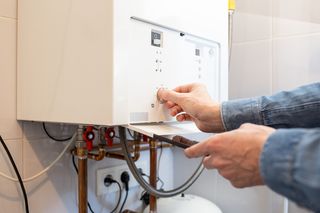What is an immersion heater — and why would I need one?
Immersion heaters are known for their reliability and longevity, but present issues over cost and efficiency

They are a common appliance in homes across the UK, but what exactly does an immersion heater do and when is it a good idea to have one?
Immersion heaters are used to heat water for heating and washing, but they present both advantages and disadvantages in terms of cost, time, and energy efficiency.
如果你想installing an immersion heater, you may want to consider your full range of options foroil boiler alternativesandgas boiler alternativestoo.
What is an immersion heater?
An immersion heater uses an electric heating element to heat water. The element, which resembles a metal loop, is placed inside a hot water cylinder in order to heat the surrounding body of water.
The cost of an immersion heater element will depend on the metal it is made from. A copper immersion heater typically costs around £25-£35 to buy, whereas a titanium immersion heater – such as thisTesla product from Screwfix– costs an average of £35-£50.
How do immersion heaters work?
An immersion heater works in a similar way to a large kettle. The metal heating element is placed into the water cylinder and a strong electric current passes through to heat the metal and therefore the surrounding water.
As cold water enters the bottom of the cylinder it warms up and rises to the top where the heating element is situated. As more cold water enters the pressure rises and the hot water at the top is forced out through the pipes.
The difference between a water heater and an immersion heater is that water heaters often refer to whole-house systems, while immersion heaters are specifically for heating the water within a tank or cylinder.
Pros of immersion heaters
Oliver Creevy, managing director and co-founder ofInsulation Advisor, says immersion heaters are highly energy efficient because they directly heat the water they are immersed in, minimising heat loss.
They are known for their reliability and longevity, they require minimal maintenance. Immersion heaters can function independently of a central heating system, providing hot water even if the boiler is not operational or if the property doesn’t have the space for an oil tank.
They can also heat water quickly, making them ideal for on demand hot water needs.
Immersion heaters are particularly useful in situations where a consistent and reliable source of hot water is needed.
Cons of immersion heaters
Peter Clayton, fromTrade Plumbing, says the main downside of an immersion heater is that it requires heating a full tank of water, meaning if you require a small amount you will still have to heat the whole tank. Not only is this time consuming but it can result in a significant waste of energy.
Furthermore, when the heater is turned off the hot water begins to cool immediately so all the electricity used to heat the tank will be wasted.
For this reason, a timer is needed to heat water at specific times otherwise you could be waiting hours when you wish to use hot water.
Of course, this also means that the time you choose to shower or bath will be limited to certain periods during the day.
FAQs
Do immersion heaters use a lot of electricity?
Immersion heaters are typically known for high electrical consumption, says Peter Clayton from Trade Plumbing. This is mainly down to the fact that they cannot be used to heat small amounts of water, but rather a full tank for each use.
On average an immersion heater uses 3kW per hour, with the current energy price cap of 27p/kWh that is roughly 81p per hour. Immersion heaters can take anywhere from one to two hours to heat up so they have the potential to cost £1.62 alone to heat up.
Immersion heaters can be very expensive for those who are looking for a constant supply of hot water. The installation of a thermostat allows homeowners to keep their immersion heater on constantly, but at a lower temperature so it uses less electricity throughout the day and is less time consuming when it comes to heating up.
Get the Homebuilding & Renovating Newsletter
Bring your dream home to life with expert advice, how-to guides and design inspiration, direct to your inbox.
Sam is based in Coventry and has been a news reporter for nearly 20 years. His work has featured in the Mirror, The Sun, MailOnline, the Independent, and news outlets throughout the world. As a copywriter, he has written for clients as diverse as Saint-Gobain, Michelin, Halfords Autocentre, Great British Heating, and Irwin Industrial Tools. During the pandemic, he converted a van into a mini-camper and is currently planning to convert his shed into an office and Star Wars shrine.
Most Popular
Bring your dream home to life with expert advice, how-to guides and design inspiration, direct to your inbox.
Thank you for signing up to Homebuilding. You will receive a verification email shortly.
There was a problem. Please refresh the page and try again.

